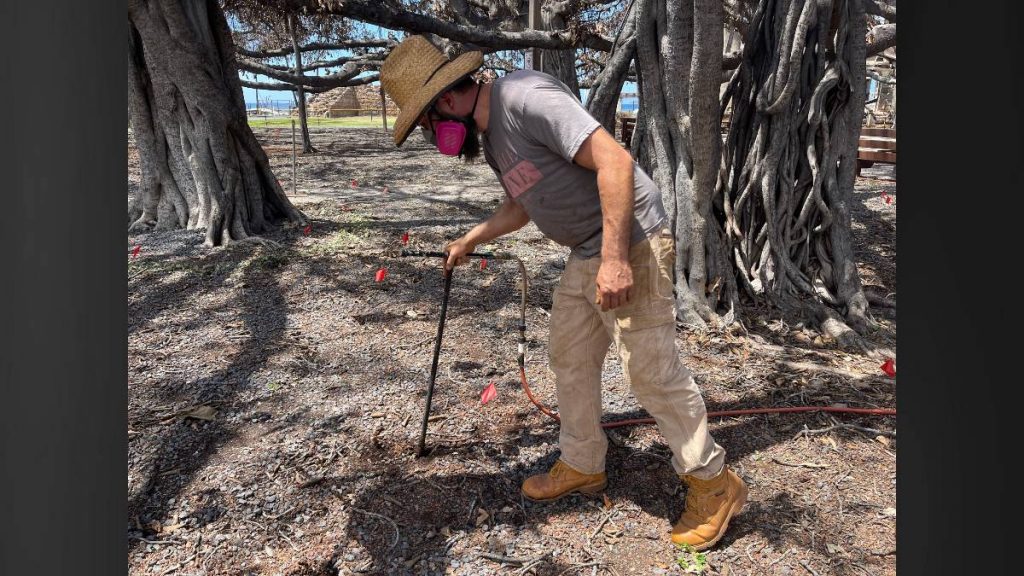Lāhainā’s historic famed banyan tree gets TLC

To the untrained eye, the 150-year-old Banyan Tree in Lāhainā isn’t showing any signs of life.
Thousands of leaves on the mammoth tree are scorched but its multiple trunks show little sign of being singed during the Aug. 8 firestorm that devastated this historic, coastal West Maui community.
Just days after the fire, volunteers arranged for water tankers to come by and douse it
with hundreds of gallons of water every few hours. Maui arborists, landscapers, and
volunteers formed a hui to care for the tree and now it’s receiving unprecedented tender
loving care.
On Thursday, landscape contractor Chris Imonti had a crew out providing even more
TLC and he revealed signs of hope – signs of life.

“We did root samples last week and we had very good news as far as new life in the
roots. A lot of new roots shooting off. We tested the moisture and arborist Steve Nims,
who is the unofficial leader of the Banyan Tree hui has analyzed all the treatments and
he is out today putting sensors on the tree to measure growth rates. With the compost
tea we are seeing good results and as long as we give it enough love, I think it’s going
to be fine,” Imonti commented.
He is one of thousands of people locally and from around the world who have a special
place for the tree, which covers an entire half a block. Weddings, vow renewals,
honeymoon photographs, are among the multitude of memories people have of the
Lāhainā banyan.
The ultimate survival of the tree has become symbolic of what many hope for the fire-
ravaged town.
Imonti, who owns and operates C. Imonti Landscaping said, “I’ve been here for years
and years so, like many others, I have a personal attachment to the tree. To me, it’s a
symbol of hope. We’re taking it to heart to try to bring back the tree, to give some hope
to Lāhainā. We don’t know what’s down the line, but I think it’s going to be a new
beginning for everybody.”

In addition to keeping the bare ground around the tree well-watered it has been aerated
and is getting treatment from a tree-loving soup of “compost tea.” The color of tea,
Imonti has formulated his own mix of natural ingredients being shot into the ground
around the circumference of the tree. In addition, volunteers chopped up small blocks of
alfalfa, a legume, and spread it around on the ground. It’s an experiment to see if the
nutrients contained in the alfalfa will help.
At the Lāhainā Small Boat Harbor and behind the burned-out shell of the old
courthouse, signs detailing the historical significance of the tree survived the flames.
They detail the tree’s history.
Beneath an undated, but old photo of a large crowd gathered in the shade of the tree,
the placard reads, “Planted as a sapling in 1873, the Banyan Tree’s majestic
proportions have been lovingly tended and symmetrically shaped by Lāhainā residents.
They used the comfort of its shade as a gathering place for recreation, lu‘au feasts, and
ceremonial events.”
Perhaps, the tender loving care the tree is getting now, will restore the Banyan Tree to,
as the signs proclaims, “Lāhainā’s Banyan Tree – A Gathering Place.”





